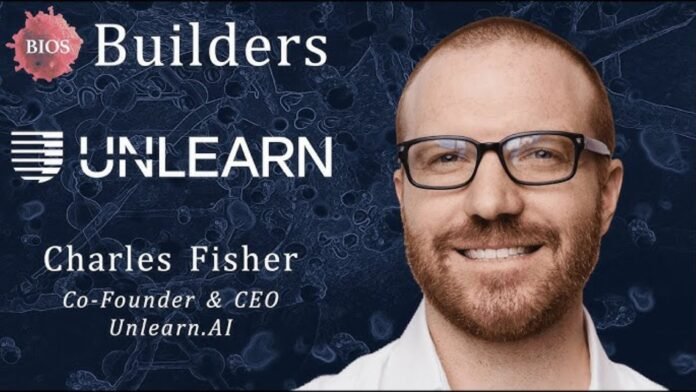The Zero-Trial Vision: How Dr. Charles Fisher’s Unlearn Is Using AI Digital Twins to Eliminate Trial and Error in Medicine
H2: Dr. Charles Fisher: The Theoretical Physicist Building the Future of Medicine
Dr. Charles Fisher, the Founder and CEO of Unlearn, embodies the modern deep tech innovator—a scientist with a background spanning theoretical physics, machine learning, and computational biology (including roles at Pfizer and Harvard). His journey didn’t begin with a specific medical problem, but with a conviction about the future of Generative AI.
Fisher’s core belief was that generative models—AI that creates new, synthetic data—could be used to simulate complex scientific systems better than traditional mechanistic models. He and his co-founders sought a problem worthy of this power, eventually landing on the biggest bottleneck in drug development: clinical trials.
His unique angle is simple but profound: Eliminate trial and error in medicine by making the placebo control group virtual. This innovative strategy creates a powerful alignment of ethical, financial, and scientific goals.
H2: The Core Innovation: Digital Twins as Virtual Control Arms
The current standard for drug approval, the Randomized Controlled Trial (RCT), is ethically and financially burdensome. To prove a drug works, a large cohort of patients must receive a placebo, which is often a lost opportunity for treatment. Trials can take years and cost hundreds of millions of dollars.
Unlearn’s Digital Twins Clinical Trials (TwinRCTs) platform uses proprietary generative AI models (Digital Twin Generators, or DTGs) to solve this:
H3: How the Digital Twin is Created
- Data Ingestion: The DTG models are trained on massive, rich, longitudinal datasets from historical clinical trials and real-world studies (often 1 million+ patient records).
- Individualized Forecasting: For every patient enrolled in a new trial, the AI uses only their baseline data (pre-treatment) to create a unique Digital Twin.
- Simulation: This digital twin is a sophisticated computer model that forecasts what that specific patient’s individual health trajectory—every symptom, lab result, and outcome—would be if they received the placebo (or standard of care) instead of the new treatment.
H3: The TwinRCT Advantage: Faster, Cheaper, More Ethical
By incorporating these AI-generated digital twins into the trial analysis, Unlearn achieves critical gains for biotech startups and pharmaceutical giants alike:
- Accelerated Timelines: Reducing the required number of real-world placebo patients allows for smaller, faster-to-enroll trials. Studies have shown the potential to reduce control arm sizes by 12% to 39% in complex Phase 3 trials (e.g., Alzheimer’s disease), slashing months or even a year off a multi-year trial timeline.
- Reduced Cost: Fewer patients, fewer sites, and less time directly translate to millions of dollars saved, freeing up precious startup funding for further innovation.
- Ethical Innovation: The technology minimizes the number of patients who must receive a potentially ineffective placebo, aligning with the founder mindset of patient-centric care and AI ethics in business.
H2: The Zero-Trust and Forward-Looking Perspective
A key element of Unlearn’s success, which resonates deeply within the tech and regulatory communities, is the concept of a “Zero-Trust” solution. Fisher’s team recognized that machine learning models make mistakes. Therefore, their methodology, which has received a favorable qualification opinion from the European Medicines Agency (EMA) for Phase 2/3 trials, is designed to prove that the AI-augmented trial produces the right answer even with model errors. The statistical rigor ensures that the predictions at the population level are reliable and auditable.
H3: The Multi-Part Master Plan
Fisher’s long-term vision extends far beyond clinical trials:
- Phase 1 (Current): Use Digital Twins to optimize clinical trials (TwinRCTs) and build an amazing business.
- Phase 2 (Near Future): Improve the AI to simulate the effects of multiple existing treatments, creating an in-silico comparative effectiveness platform to see which available drug works best for a population.
- Phase 3 (Long-Term): Develop the AI until its individual-level predictions are accurate enough to be used to guide personalized medicine—a doctor checking a patient’s digital twin before prescribing treatment.
This sequenced strategy—starting with a viable product in a regulated domain to build trust and revenue, then scaling capability toward the ultimate vision of eliminating trial and error entirely—is a blueprint for all deep-tech innovators.
H2: Key Takeaways for Founders
- Start with the AI, Not Just the Problem: Unlearn’s success proves the power of letting a core technological conviction (Generative AI for complex simulation) guide the choice of problem, rather than the reverse.
- Solve the Ethical-Financial Dilemma: The most valuable innovations are often those that solve a massive financial problem while simultaneously solving a deep ethical concern (like minimizing placebo use).
- Target Auditable, Zero-Trust Solutions: In regulated industries like biotech and finance, ensure your AI model’s methodology proves the reliability of the outcome, even if the individual predictions are imperfect. Build for transparency and statistical rigor first.








